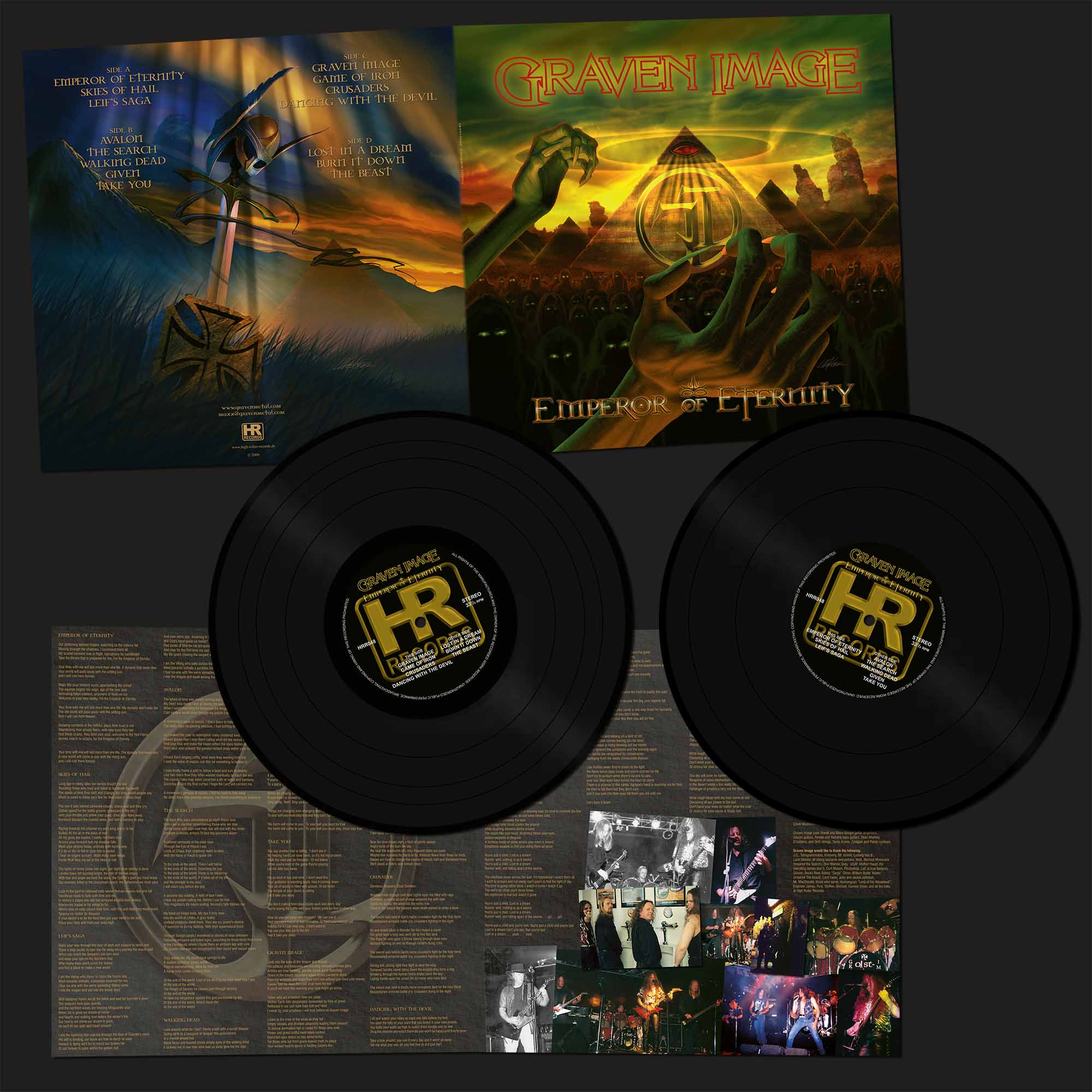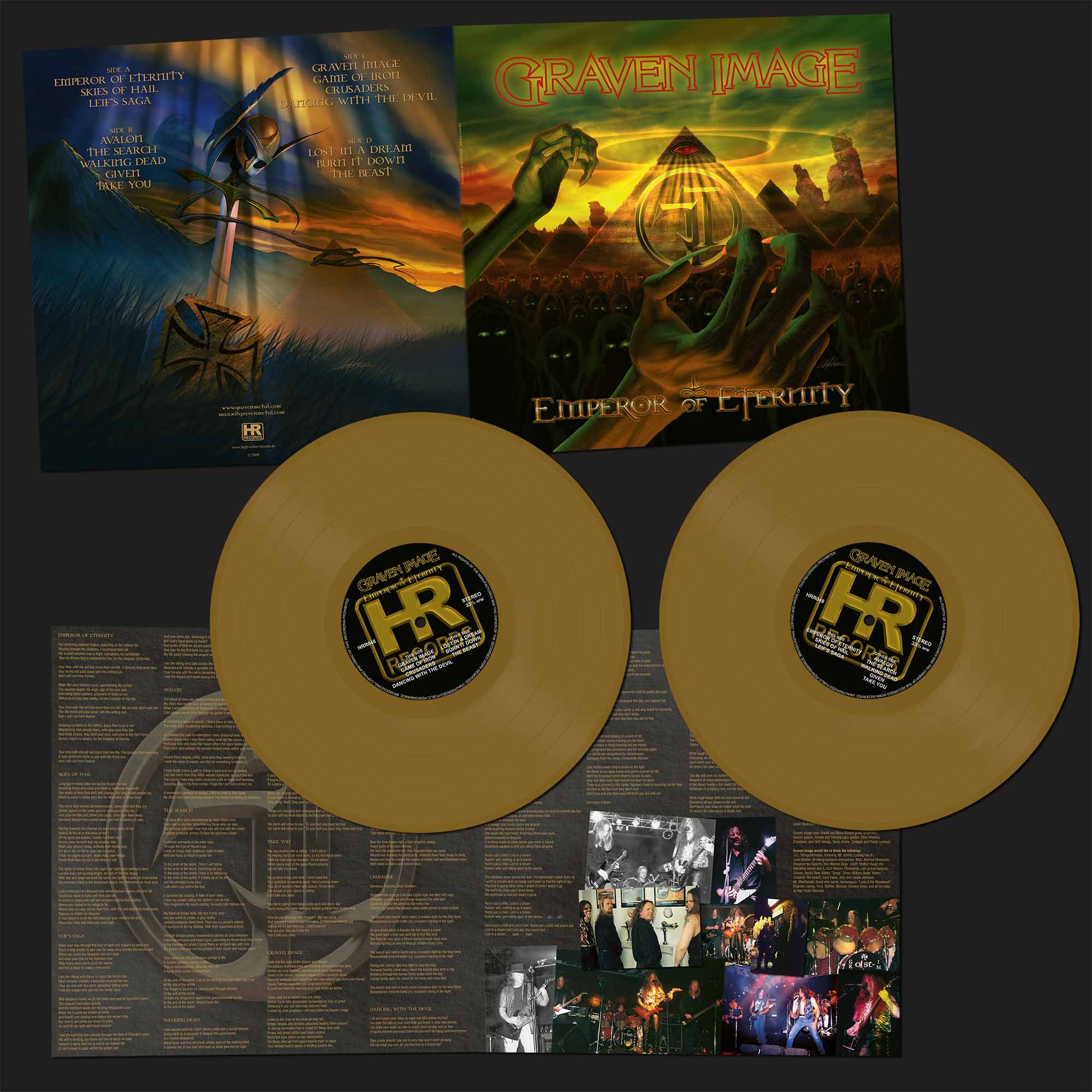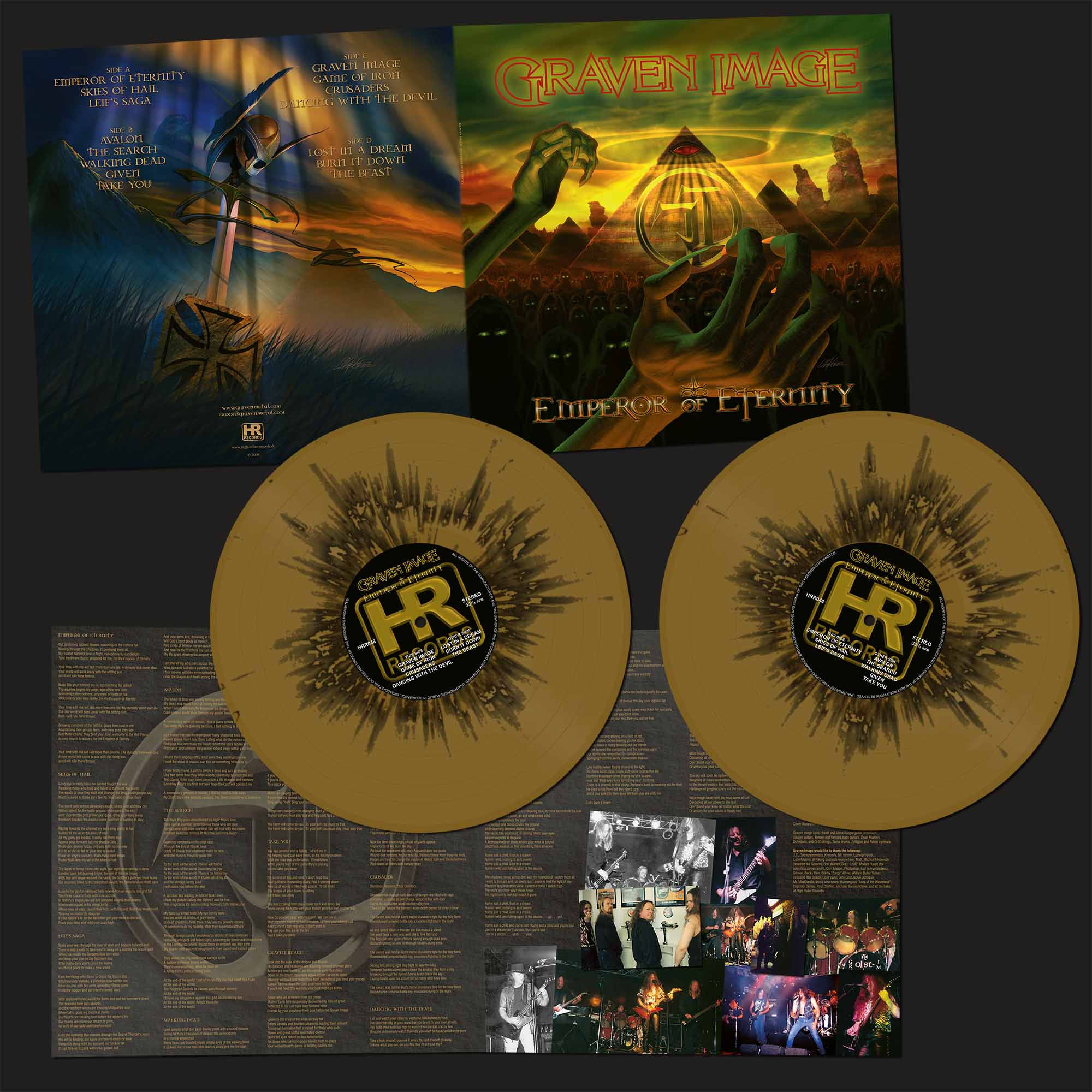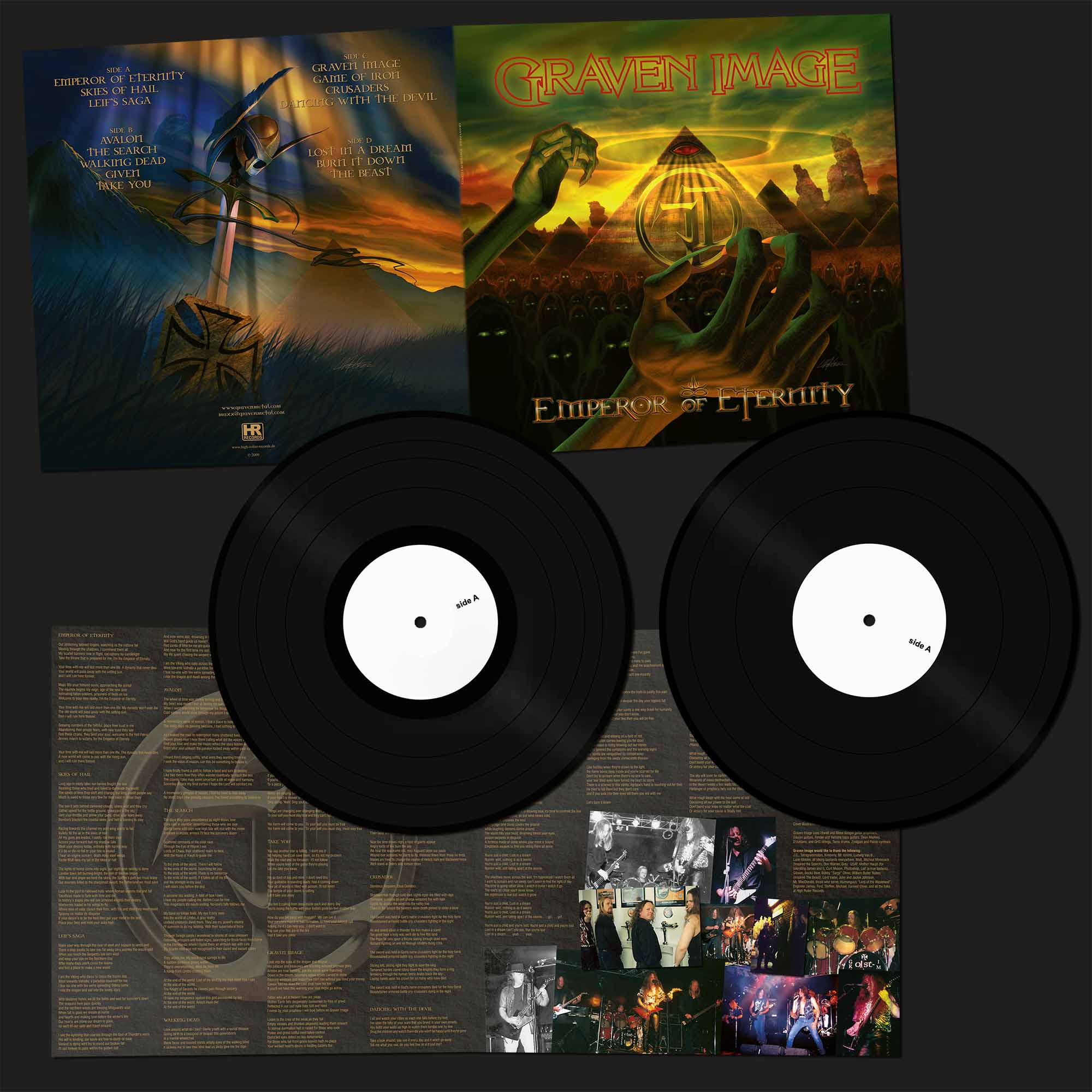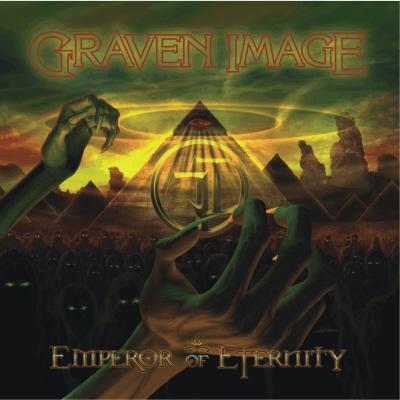 | ||||
| GRAVEN IMAGE - Emperor Of Eternity DLP | |
HRR 048, limited to 500 copies, gatefold cover, 100 x gold/ black splatter, 150 x gold + 250 x black vinyl | |
| Maxx Christopher - Lead Vocals & Guitars James Houptmann - Guitars & Vocals Corey Shartier - Bass Guitar Olly Oliver - Drums & Vocals | |
| - Emperor Of Eternity - Skies Of Hail - Leif's Saga - Avalon - The Search - Walking Dead - Given - Take You - Graven Image - Game Of Iron - Crusaders - Dancing With The Devil - Lost In A Dream - Burn It Down (live) - The Beast (live) | |
SOLD OUT! | |
Graven Image? Does that ring a bell? Yes, well, didn't they release two 12" EPs called "People In Hell Want Ice Water" and "Warn The Children" in the mid 80's? Nope! That's a different band. We are talking about four guys from Kansas City, Missouri, who kick-started their career in 1995. Guitarist turned vocalist Maxx Christopher talks about the confusion surrounding the band's name: "When we formed, there was no internet on which to search for such information, so no, we had no idea that there had been another band by that name. No-one here had ever heard of them. We found about about the other band from the European metal magazines that reviewed our music in 2000 and we were dismayed. I filed for the trademark in 1999 and the name was unowned. Since then the many bands calling themselves Graven Image caused us to abandon the name. Today I have the sole legal right to the name if I want to defend it … which I do not. We will just let it be."
The origin of Graven Image goes back to guitarists Maxx Christopher and James Haupt playing together in a band from 1987 until 1991 doing covers of Iron Maiden, Judas Priest, Deep Purple, Sabbath and other classics. The years of playing cover songs gave them enough confidence and experience to begin composing original songs, and in 1991 they decided to form a new band to write, perform, and publish their own music. They searched for two years to find other players that not only shared their vision and influences, but the dedication to follow a course of action. In 1995 Graven Image was born and the "Game Of Iron" mini-CD was released. It was originally supposed to be a full-length record but financial restraints limited the recording to five songs. Soon after the release of "Game Of Iron", the singer, Paul Brown, had problems with his vocal chords. The band patiently waited for two years for Brown to fully recover from throat surgery when Maxx discovered that Brown's problems were due to drug use. Brown was fired and for another two years singers came and went as the band's plans for the new CD languished. Several different vocalists passed through the line up from 1997 until 1999. This fluctuation cemented Maxx's determination to eliminate the position and put himself on lead vocals. Graven Image retooled and worked hard on the four piece line up for six months and recorded "Emperor Of Eternity" in late 1999. The record was released early in 2000 and received good reviews from metal magazines in America and Europe.
Both records, "Game Of Iron" and "Emperor Of Eternity", make up the double vinyl released on High Roller Records, plus two exclusive live versions of "Burn It Down" and "The Beast". Maxx elaborates on the album: "The LP will be a double album and our artist Lane Meister has even reworked the covers digitally. We are very excited about this release by High Roller. LPs are just way to cool and we have never thought CDs had the same class as the old vinyl records. I can't wait to open one and smell that new vinyl. The songs 'Burn It Down' and 'The Beast' are from the unreleased Graven Image record "Modern Alchemy". These two versions were recorded live at the Agora Theater in Cleveland, Ohio in 2002. We thought it might be cool to let our fans hear something new and to get some feedback on these songs. I chose live recordings, because we may release the full studio album in the near future if there is a demand for it. We hope that people want to hear more. There are 14 kick ass songs on "Modern Alchemy" that we haven't given to the world yet and we worked our asses off on the album."
As mentioned earlier, Maxx Christopher switched from playing only guitar on "Game Of Iron" to also sing on "Emperor Of Eternity". How difficult did that change turn out for him? Christopher: "I had been singing backup vocals for several years and my voice was ready, but learning to separate the two hemispheres of my brain was difficult. It took six months of intense rehearsals for me to pull it off. As time went on, it became easier to do but the level of concentration remains the same. I didn't want to arrange songs to make it easy, so the difficulty level stayed relatively constant. I like the challenge."
With songs like "Leif's Saga" dealing with Viking themes, could it be that "Emperor Of Eternity" is some kind of concept album? Maxx Christopher does not think so: "No, "Emperor Of Eternity" is not really a concept album. I have been asked that many times and I believe that impression comes from the fact that I write most of our material. I do however try to make sure each record has some sort of theme or motif that binds each song together on the record as a complete work. Sabbath are masters at that art. Every one of their records sounds different but all the songs on each belong within that given record. I have tried to carry on that vision with our music because I think it gives each album a flavor of its very own. When I arrange a record, I try to see how the songs fit together to form a theme of sorts. The beginning and ending of each song flows into the next creates a stream of consciousness if possible. In my mind every album knows what it wants and I just have to find out what that is. I spend a lot of time on the arrangement so that the record flows along and leads the listener on an emotional journey. A journey I have already taken. Beethoven said: 'The power of music is to transport the listener into the mind of the composer at the time the composition was written. No other artistic medium has that power.' 'Leif's Saga' is a song I wrote for Leif Erikson and his adventures in Vinland. Leif tried to establish a Viking colony in Nova Scotia, North America, somewhere in the late 700's A.D. Leif led his ships to North America suing only the Northern Star and a tale told by another Viking mariner named Bjarney Herrolfsen, who told him of a land far to the west of Greenland in those days. I have a degree in history and I find the Viking achievements to be intriguing. I was unaware of Leif ever having his own Saga so I wrote one for him that honored his efforts and bravery when he tried to make a go of it here in America."
"Skies Of Hail" is another track with interesting lyrics, as Maxx explains: "As I said before, I have a degree in history and my own Grandfather died at the tail gun of a B-17 flying fortress over Europe sometime in 1943. Much of my life has been spent trying to understand why he died and what was it all about. I discovered that besides the politics involved there were also ancient forces at play like the defense of home and family. I wrote the song as a tribute to those who fought in the skies of Britain and elsewhere in WW2 really. Much like the knights of old the fighter pilot was alone on the field of battle against his foe who sought his life. The idea began after I read a biography of Gunther Rall who had somewhere around 396 air to air victories in WW2. I was amazed and saddened by his story. All that he went through during the course of the war became a lense for me to see how easy and mundane my own life was. I studied the experiences in detail of the American Eagle squadrons, the R.A.F., and the Luftwaffe above that tiny little island and was struck by the sheer amount of will that was exerted on a human level there. It is too bad all of it was to destructive ends and I think we all learned a lesson. With hope that we have I wrote the song. The song starts from the British pilot's point of view until he gets shot down, and then follows the German pilot's point of view as he flies back to land in France. This song is NOT about politics. It is about personal effort and personal trials. Politicians are rich people that start wars and leave it to the little people to fight them. This song is about the little people and I will continue to stress that fact in my music and professional life. That is why the last verse of the song speaks of the struggles through history as being suffered by the common man not Ceasars and Pharoahs. I find the whole war a disgusting fratricide among my brothers, perpetrated by aloof elites, and today we can see the fruit of their folly in our declining population rates, yet the elites among us are still playing their games. As an aside, I also got to work the words Focke Wulf into the song which I found most satisfying, because the Focke Wulf 190-F is my favorite fighter plane of WW2. I know that they didn't appear in the Battle of Britain but neither Messerschmidt nor BF 109 would fit lyrically. Anyone who likes the theme I laid out in 'Skies Of Hail' should listen to 'Cross Of Iron' from our Doomshade record in 2007. I actually wrote about three World War 2 vets I know personally or know of. The first verse is about Albert Schmidt and his experience at Stalingrad, the second verse is about my grandfather in his B-17 over Europe, and the third about an old Brit I met named Ian who was a submariner that fought against the Bismarck. 'Cross Of Iron' is about the human experience of war that goes before politics and propaganda and so is 'Skies of Hail'."
Graven Image's style has often been compared to epic US Metal bands like Cirith Ungol, Brocas Helm and Manilla Road. Max reflects: "When we first heard Manilla Road back in 2001, I did not see the comparison at all. After playing with them last summer I do. Mark's guitar playing has some of the same style as mine, and he likes to play solos. Manilla isn't afraid to write eight minute songs either, so I can see some similarity. Perhaps since we are both from the Midwestern USA there is more to it than that but I would have to rely on people who are removed from our Midwest environment to judge such things. I can say that it is an honor to be mentioned in the same breath as them. Cirith Ungol I never could see the comparison except that maybe I like to write about Vikings. Doomshade, the follow-up band to Graven Image, has been compared to Cirith Ungol as well, and that comparison I would say is more accurate because the Doomshade vocals are darker and have a deeper timber than Graven Image due to Jay Stadler's huge lungs. I am still not familiar with Brocas Helm although I like the name. I write what I hear and don't pattern our music after anyone specifically. I have cut songs in the past if they did sound too much like any other group, however I'm sure that overtones from our influences are impossible to avoid. There are only so many notes on a guitar."
Matthias Mader
Graven Image - 1995 - 2009
Maxx Christopher and James Haupt began Graven Image in 1992. They had spent the final years of the 1980's performing cover songs with a band called Joker in Kansas City, Missouri. Deep Purple, Judas Priest, Iron Maiden, and Black Sabbath were the primary influences they had covered and they felt it was time to begin composing their own music. They began their search for new members with lots of cold beer and the dream to add their own music to the chorus of metal banging heads across the world.
The first member they added was singer Paul Brown who had a timber of voice that was similar to Ozzy. They felt with a little development he could be a fine metal singer. The search went on for over a year for just the right people. In the age of grunge and glam rock they found it difficult to find people with the same influences. "We would ask these guys a simple question," recalled Maxx," Do you like Sabbath? If they didn't exclaim something like Fuck Yeah! Then we showed them the door."
There had been many auditions and disappointments along the way but eventually Olly Oliver was recruited to play drums through an advertisement in a local music rag, and that same publication yielded bassist Matt Nutt as well. Maxx and James felt that the point of the band was composition, and playing clubs without a product to place in people's hands would be ass backwards. The rest of the band agreed and the primary thing on their agenda was to write and record an album.
They began work on what would become Game of Iron late in 1993. Over the next six months they rehearsed three times a week and prepared eight songs for the studio. No-one in the band was wealthy and studio time was very expensive. The plan was simple: to rehearse so much that they could maximize their time in the studio and make the most out of every dollar spent. By the time they booked Chapman's Studio in 1994 the cost had gone up further so they decided to cut three songs and make a five song EP instead. Game of Iron was born.
Their plan worked well and the constant rehearsal paid off. No time was wasted in the studio and tracks were laid in one or two takes. Again the lack of money became an issue and instead of releasing Game on CD they released it on cassette. In 1995 cassettes were still a common medium and the compact disc was fairly new and just out of reach. They began live performances in Kansas City in the local club scene with cassette in hand, and the audiences showed their appreciation. Kansas City was over saturated with Nirvana clones at the time and Graven Image quickly got a reputation for being serious metal practitioners in the local clubs.
In 1996 singer Paul Brown had to have surgery to remove a node from his vocal chords so the band went on hiatus to wait for his recovery. During that time they began to write new material. Some of it eventually made it onto the Emperor of Eternity CD and some was abandoned because it didn't quite fit into the vision Maxx had for the band. The long wait took its toll and Matt Nutt left the band to start a career in the transportation industry. A few bassists tried to fit into the slot during the down time but the chemistry was missing. Then they met Corey Shartier through yet another advertisement in the local music rag and he clicked right away.
"Corey came in with a stack and a six string bass to audition for the spot. He did things on the bass we had never seen anyone in Kansas City do, and we were blown away," recalled James, "Then he left to get beer and didn't come back for like two hours so we thought he wasn't interested. When he returned he told us, with some hesitation that he had gone and bought another stack, and he apologized. We knew right then he was our guy."
Paul returned for rehearsals in 1997 after recovering from his surgery but he was struggling to regain his voice. The band worked with him for six months but his condition got worse instead of better. He requested another break so that his throat could heal further, but Maxx discovered through the grapevine that the problem was more than the surgery. Paul had been partying quite heavily and that was the real reason his vocal recovery was such a challenge. He was bid adieu in 1997 and the punishing task of finding a new singer began.
The rest of 1997 was spent trying new singers. Each had promise and each ended up having a drug problem. They all lied but Maxx was on the watch for the signs and terminated each one with prejudice. A decision had to be made that would eat up more time. Whether to keep taking risks on new singers or simply begin working with the four pieces they had with Maxx doing the vocals. In the end the die was cast and another six months were spent getting Maxx conditioned to sing and play guitar. "That was the hardest thing for me. I could sing or play guitar but not both. Eventually I learned to separate my brain hemispheres and make it happen, but it took every ounce of concentration I had."
Live performances resumed in 1998 and the band starting cementing the tracks for their new record. Many of the tracks for Emperor were initially recorded in Lawrence Kansas at Eleanor Jesse studios. The engineering department at the Lawrence studio began having problems after the drum and bass tracks were recorded, so the band began seeking another studio in which to finish Emperor. The album had gone from a recording project to a quest. BMG studios in Olathe, Kansas, filled the role. The tracks had to be re-recorded due to the declining quality of the Lawrence staff, and the album was finished finally in late 1999 at BMG.
Emperor sold well for an independent record with no advertising or backing. The album was distributed to more than 30 countries worldwide, and received the most appreciation from German metal fans. In 2001 there were four different distributors in Germany alone, and the record is still being sold today. One copy of Emperor was recently sold on Ebay for over $65.00 (U.S.) by a fan in Greece. That may have been anecdotal but it made the band feel pretty good.
From 2000 to 2002 Graven Image played shows across the USA and began assembling songs for their next record. Corey Shartier left the band in 2000 shortly after the release of Emperor to start his own mechanic shop. "We were sad to lose Corey", recalls Olly Oliver, "but he had a dream to own his own business and capitalize on his knack for working with automobiles. The guy is a mechanical genius." Long time friend and musical compatriot Charles Gallipeau joined G.I. in 2000 to fill the bass spot in the band.
One of the high points of those years was an opportunity the band had to play Avalon and Leif's Saga live on the radio station KKFI in Kansas City, Missouri. Maxx and James brought acoustic guitars to the studio, and Charles played the bass through a small Fender combo amplifier. The host, Curt Mason, interviewed them for about 45 minutes and then they played an acoustic version of both songs live on the radio. "It was intense. We have played in front of large crowds and never was I more nervous than that radio gig," said Maxx. "Here I am playing electric songs on an acoustic, because they wouldn't let us set up drums and amps at the radio station, and I'm singing into this giant boom mike while praying that I don't screw everything up. When I got home and listened to the tape of the show my wife made I was ecstatic. We nailed it."
One of the lessons learned from Emperor was the high cost of recording. After releasing Emperor the band began collecting pieces of gear to make their own recording studio. It took three years of saving and bargain hunting, but by 2003 they had assembled a decent studio in which to record their next record, Modern Alchemy. Also in that same year Charles got married and left the band. It had become apparent to the trio of Christopher, Haupt, and Oliver that Graven Image might forever be a revolving door for bass players. The only music recorded with Charles was a live show at the Agora Theater in Cleveland, Ohio in 2001. Two tracks from that show would later be released on a double LP by High Roller Records in Germany.
Matt Nutt, who played bass on the Game of Iron record, returned in 2003 to record Modern Alchemy with the band. The album was ready for release in 2004 but the band was having a variety of problems, not the least of them being their name. After the release of Emperor of Eternity and the attention it received, the band learned that there had been another Graven Image in the 1980's. They were almost unheard in the USA but had a following in Europe. Since the band that used the name in the 1980's was defunct and held no trademark on the name they continued as Graven Image until 2004.
Within three years of the release of Emperor more than twenty new bands had sprung up around America using the name Graven Image, and the band decided that the name should be changed. Even though the band held the legal right to the name, Maxx had grown weary of mailing "Cease and Desist" letters to every new Graven Image that popped up with a cheap internet site. Modern Alchemy languished as the group sought a new moniker for their music. The down time took its toll and other pursuits crept in.
James had been agitating to do a blues project for many years, and since the G.I. name debacle had taken the wind from their sails, James began rehearsing blues covers with Olly Oliver, and Matt Nutt. Maxx had no interest in their blues band and they left the group. Christopher is and was the main song writer for the band and produced the bulk of their material. He decided it would be a great opportunity to spend more time with his wife and son, and began studying 3d digital animation and illustration. The guys remained close friends but Modern Alchemy was never released.
In 2006 Olly solicited Maxx to do a project for their friend Jay Stadler. Jay liked to sing Karaoke and had a voice much like the vocalist from Pantera. Stadler wanted to make a four song CD of original tunes for his own personal amusement. Olly and Jay had formulated the rudiments for two original songs for Jay to sing, and they rounded up Matt Nutt and James Haupt to meet at the studio to work with Maxx on the project. Maxx rearranged the two songs and finished them, but then introduced them to several new songs he had written to highlight Jay's vocal style. Three months later they recorded the four new songs and Maxx mastered them. At the time they were planning to finish the project and reform Graven Image under a new name, but fate intervened.
Fate came in the form of crowd appreciation. In May 2006 the band played a show at the Grand Emporium in Kansas City. The encouragement from the audience led the band to play a few more shows and the people really seemed to respond to the music. In June of 2006 they released the four song project as a demo to sell at the shows for a few dollars, and by the end of the summer they had sold over eight hundred demos in the Midwest club scene. In the fall of 2006 they started to work on new material for a full length record.
In February of 2007 the band signed a contract with Open Grave Records to distribute the new album globally. The record was recorded and mastered by June of 2007 and released in October of that same year. Live performances continued until November when the band decided to take a much needed break. James left the band at that time to once again try his hand at blues guitar, and bassist Corey Shartier joined Maxx Christopher and Olly Oliver to play bass for Doomshade. Corey was the bass player for Graven Image on the Emperor album as noted.
The band is currently working on the follow up record for Doomshade to be released in the summer of 2009. Corey Shartier who played bass on Emperor has joined up with Doomshade and the band remains a four piece with only Maxx playing guitar. The music is not much different than Graven Image because Maxx still writes the bulk of the songs and the core group of Christopher, Oliver, and Shartier are Graven Image from the Emperor era. Long time fans will find that that this heavy metal foursome is carrying on the Graven Image tradition proudly in a new form. They even perform some of the G.I. tunes with Jay and Maxx both doing the vocals on songs like Game of Iron, Emperor of Eternity, Crusaders, Don't Ever (unreleased), and Hell March (unreleased). The band operates the websites www.gravenmetal.com for the Graven Image material, and www.doomshade.com for the Doomshade music.
High Roller Records (Germany) will be releasing a two disc LP of Game of Iron and Emperor of Eternity in the spring of 2009. The double LP also features two unreleased songs from Modern Alchemy entitled "The Beast" and "Burn it Down." The band is contemplating releasing the full studio recording later this year depending on the public reaction to these two songs that were recorded live in Cleveland Ohio back in 2002. If there is enough interest in the album to make it fiscally viable, then they will publish the full 14 song record which contains some of the best material Graven Image ever wrote. "Burn it Down" and "The Beast" are just a small taste of what Modern Alchemy has to offer European Metal fans.
